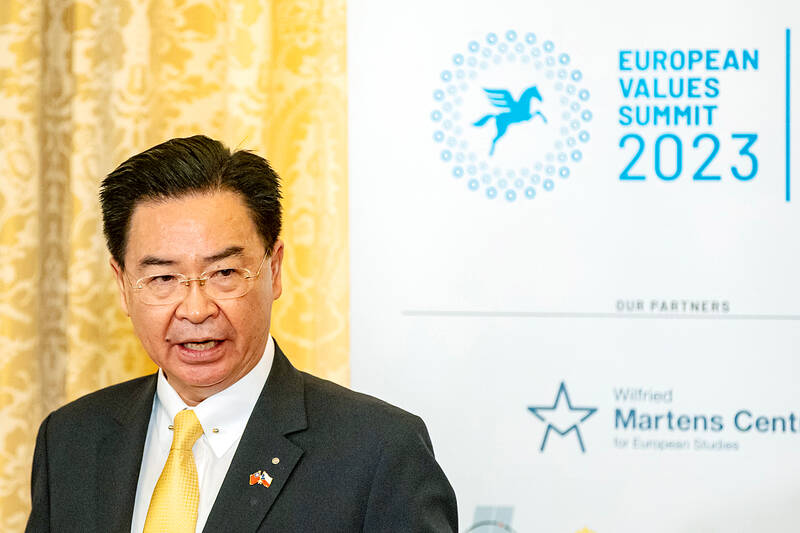Taiwan wants to secure peace and stability by maintaining the “status quo” across the Taiwan Strait, which it shares with China, and needs the support of European states to do so, Minister of Foreign Affairs Joseph Wu (吳釗燮) said yesterday.
“In order for Taiwan to stay strong and resilient and to have the courage to continue the policy of maintaining the status quo, we do need support from European friends,” Wu said in a speech at a conference in the Czech capital, Prague.
Wu said Taiwan was drawing lessons from Russia’s invasion of Ukraine to strengthen its resilience against China, which he referred to by the initials of its official name, the People’s Republic of China (PRC).

Photo: EPA-EFE
“For many observers around the world, the [Chinese army] invasion may not be imminent or unavoidable, and Taiwan and [its] partners are trying to prevent it from happening,” Wu said.
“But the PRC is following Sun Zi’s (孫子) The Art of War (孫子兵法), trying to crush the enemy without going to war. As we speak, the PRC is continuing to flex its muscles to intimidate Taiwan, including sending its warplanes and vessels across the median line of the Taiwan Strait,” he said.
Taiwan has no formal diplomatic ties with any European country except the Vatican.
However, it maintains extensive informal relations, and central and eastern European countries have been particularly keen to show support for Taiwan — especially following Russia’s invasion of Ukraine — defying Beijing’s anger about such contacts and reducing Taiwan’s diplomatic isolation.
Wu spoke at a think tank event immediately after an opening speech by Czech President Petr Pavel, which Wu watched from the front row. Pavel left the room after his speech.
Wu, on a second trip to the central European NATO and EU member country after a 2021 visit, on Tuesday met with Czech Senate Speaker Milos Vystrcil, who has been at the forefront of Czech efforts to build a closer relationship with Taiwan and visited it in 2020.
Two sources briefed on Wu’s trip, who spoke on condition of anonymity as they were not authorized to speak with the media, said Wu was also expected to visit Brussels, the headquarters of the EU.
The Chinese Ministry of Foreign Affairs on Friday last week urged Europe not to have any official exchanges with Taiwan or support any “independence forces.”
In other news, Gian Marco Centinaio, vice president of the upper house of the Italian parliament, arrived in Taiwan yesterday for a six-day trip, the Ministry of Foreign Affairs said.
Centinaio’s trip represents the highest-level visit by an Italian parliamentarian since Taipei severed diplomatic relations with Rome in 1970, it said.
The delegation, which also includes Italian Senator Elena Murelli, is the first parliamentary group to visit Taiwan since Italian Prime Minister Giorgia Meloni of the Brothers of Italy took office in October last year.
The delegation aims to gain a deeper understanding of Taiwan and explore opportunities for bilateral collaboration in the fields of politics, trade, technology and culture, among others, the ministry said.
Additional reporting by CNA

Taiwan is projected to lose a working-age population of about 6.67 million people in two waves of retirement in the coming years, as the nation confronts accelerating demographic decline and a shortage of younger workers to take their place, the Ministry of the Interior said. Taiwan experienced its largest baby boom between 1958 and 1966, when the population grew by 3.78 million, followed by a second surge of 2.89 million between 1976 and 1982, ministry data showed. In 2023, the first of those baby boom generations — those born in the late 1950s and early 1960s — began to enter retirement, triggering

ECONOMIC BOOST: Should the more than 23 million people eligible for the NT$10,000 handouts spend them the same way as in 2023, GDP could rise 0.5 percent, an official said Universal cash handouts of NT$10,000 (US$330) are to be disbursed late next month at the earliest — including to permanent residents and foreign residents married to Taiwanese — pending legislative approval, the Ministry of Finance said yesterday. The Executive Yuan yesterday approved the Special Act for Strengthening Economic, Social and National Security Resilience in Response to International Circumstances (因應國際情勢強化經濟社會及民生國安韌性特別條例). The NT$550 billion special budget includes NT$236 billion for the cash handouts, plus an additional NT$20 billion set aside as reserve funds, expected to be used to support industries. Handouts might begin one month after the bill is promulgated and would be completed within

NO CHANGE: The TRA makes clear that the US does not consider the status of Taiwan to have been determined by WWII-era documents, a former AIT deputy director said The American Institute in Taiwan’s (AIT) comments that World War-II era documents do not determine Taiwan’s political status accurately conveyed the US’ stance, the US Department of State said. An AIT spokesperson on Saturday said that a Chinese official mischaracterized World War II-era documents as stating that Taiwan was ceded to the China. The remarks from the US’ de facto embassy in Taiwan drew criticism from the Ma Ying-jeou Foundation, whose director said the comments put Taiwan in danger. The Chinese-language United Daily News yesterday reported that a US State Department spokesperson confirmed the AIT’s position. They added that the US would continue to

The National Development Council (NDC) yesterday unveiled details of new regulations that ease restrictions on foreigners working or living in Taiwan, as part of a bid to attract skilled workers from abroad. The regulations, which could go into effect in the first quarter of next year, stem from amendments to the Act for the Recruitment and Employment of Foreign Professionals (外國專業人才延攬及僱用法) passed by lawmakers on Aug. 29. Students categorized as “overseas compatriots” would be allowed to stay and work in Taiwan in the two years after their graduation without obtaining additional permits, doing away with the evaluation process that is currently required,